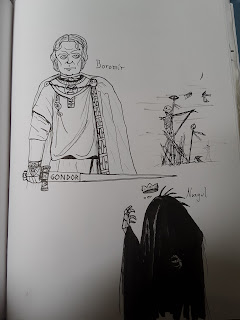The Platypus Reads Part XXVI
Why pulp? After all, there are so many great books out there, why bother with the low-brow of bygone era? Sure, there's a lot to dislike about pulp, particularly Edwardian pulp: the overt racism, the Social-Darwinism, awkward gender-roles, inconsistent quality of writing, and the endless assertions that "no, no, THIS was my greatest battle" at the outset of each new episode. You could level the same accusations at Homer, but almost 3,000 years of human opinion affirms that Homer is at a completely different level from "Moderately-Helpless Space Babes of mars."
Pulp may have multiple virtues in its own humble way, but I think the one that looms largest is precisely the one that our age lacks: courage. Courage is the ability to do what one thinks is right in spite of fear. After two world wars and the shattering loss of Western cultural confidence in their wake, courage has almost vanished from among our everyday virtues. Sure, it makes good rhetoric during a presidential campaign, but how often do we hear the exhortation as individuals to "be courageous."
Beyond that, our courageous acts are just not that courageous anymore. We protest the actions of a government that allows the greatest amount of free speech in human history and think ourselves moral giants. We march in the streets to protest a war, or immigration restrictions, or social injustice and then pat ourselves on the back knowing full-well that there will be no fire-hoses, no attack dogs, no knight-sticks, and no tear gas. Religious groups publicly decry the erosion morality when their ancestors in the faith were torn apart by lions for far less. All these accusations may be more than fair, but the point is that it costs us so little to speak out in proportion to how much pride we take in doing it. Even this post is about as courageous as ordering a bean burrito with no onions and no red sauce.
Pulp reminds us in direct and plain language that sometimes sticking it to the man comes at a much higher price than spending a pleasant afternoon outside with lots of like-minded people; and that's when we find out what our courage is really worth.
Pulp may have multiple virtues in its own humble way, but I think the one that looms largest is precisely the one that our age lacks: courage. Courage is the ability to do what one thinks is right in spite of fear. After two world wars and the shattering loss of Western cultural confidence in their wake, courage has almost vanished from among our everyday virtues. Sure, it makes good rhetoric during a presidential campaign, but how often do we hear the exhortation as individuals to "be courageous."
Beyond that, our courageous acts are just not that courageous anymore. We protest the actions of a government that allows the greatest amount of free speech in human history and think ourselves moral giants. We march in the streets to protest a war, or immigration restrictions, or social injustice and then pat ourselves on the back knowing full-well that there will be no fire-hoses, no attack dogs, no knight-sticks, and no tear gas. Religious groups publicly decry the erosion morality when their ancestors in the faith were torn apart by lions for far less. All these accusations may be more than fair, but the point is that it costs us so little to speak out in proportion to how much pride we take in doing it. Even this post is about as courageous as ordering a bean burrito with no onions and no red sauce.
Pulp reminds us in direct and plain language that sometimes sticking it to the man comes at a much higher price than spending a pleasant afternoon outside with lots of like-minded people; and that's when we find out what our courage is really worth.


Comments
So far, my favorite pulp is Burroughs' Mars books (who doesn't love John Carter and Dejah Thoris?), and She by Rider Haggard. Favorite modern pulp is the Dirk Pitt novels by Clive Cussler, though the last few haven't been that great.
This is brilliantly written! James, have I ever told you how much I enjoy reading you blog?? I too have questioned our, specifically Christians' lack of courage in the world. I discuss it in my blog as Christian flight, where Christians flee to safety of suburbia rather than being a light in the darkness of the inner city. And I too am part of that, as I write from my secluded little apartment... Thanks for the reminder!
One of the key moments of the film is that very first movement towards courage. Tony Stark, with holes in his heart, hooked up to a car battery, in a cave, is told to construct missiles for terrorists. He bemoans his fate to Yensin, as he realizes that the terrorists will never let him leave alive no matter what he does, and that he has a week to live.
Yensin looks at him calmly, and says, "Then this is a very important week for you." Tony thinks on this, and begins his plans to make the Mark I Iron Man suit.
That very first turning toward courage intrigues me, and it seems to propel the rest of the movie forward. Everything changes after that.
How many of us have a Yensin that can spur us towards courage? Can pulp itself function in that fashion?